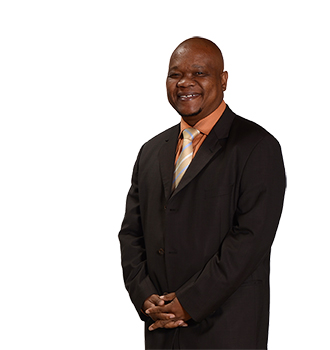Latest News Archive
Please select Category, Year, and then Month to display items
02 January 2025
|
Story Gerda-Marie van Rooyen
|
Photo Supplied
 Leading the research in South Africa is Prof Linus Franke from the Department of Soil, Crop and Climate Sciences.
Leading the research in South Africa is Prof Linus Franke from the Department of Soil, Crop and Climate Sciences.
Scientists are actively pursuing the successful breeding of diploid hybrid potatoes from inbred lines. This is expected to revolutionise potato breeding as it holds the key to rapid genetic progress. It will introduce new varieties for commercialisation through seed. Currently, existing potato variants have a gene that renders self-pollinated seeds infertile.
Prof Linus Franke, an academic in the Department of Soil, Crop and Climate Sciences at the UFS, is leading the research in South Africa. “This technology allows the production of genetically uniform potato seed that is easy to transport and largely disease-free.” He says this differs from conventional breeding whereby only vegetative propagation is possible due to tetraploid varieties in potatoes. It also risks carrying pests and diseases from one generation to the next – leading to the accumulation of pests and diseases with each round of multiplication.
Seed innovation
Prof Franke explains that Solynta BV, a seed company based in the Netherlands that produces potato varieties that can be grown from seed, has included South Africa in their research efforts because it is one of Africa’s largest producers and exporters. Through his academic relationship with Wageningen University and Research, a Dutch institution renowned for its agricultural endeavours and food production, the UFS became involved in researching hybrid potatoes grown from seed.
Diploid seeds containing two sets of chromosomes allow easier gene manipulation to increase predictability and speedier genetic progress. The breeding approach enables the incorporation of tolerance to pests, diseases, abiotic stresses (cold, heat, drought) and other desired genetic traits.
Although Prof Franke is optimistic about this research, he is not blind to disadvantages. “Potato seeds are tiny and have little energy reserves, making it harder to grow potatoes from seed than from tubers.” He says potatoes from seed will take longer to cultivate than tubers, as farmers need to grow plantlets from seeds first, adding six weeks to the growing period. “It is possible that commercial farmers can grow potatoes directly from seed. Alternatively, perhaps more likely, specialised growers will produce tubers of potatoes from seed; these tubers are then sold as seed tubers to other potato farmers, who then continue their normal practices of producing potatoes for the market from tubers.”
Financial benefits
Prof Franke says farmers have reason to get excited. “Seed potatoes will reduce input costs, as varieties with enhanced tolerance to pests and diseases require less pesticides. Planting one hectare of potatoes requires three to four tonnes of potato tubers, but only one 25 g packet of potato seeds.” Since potatoes are a more valuable commodity than maize, this technology might also increase farmers’ income potential.
Meet our Council: MEC Tate Makgoe – A proud vision for all
2016-06-07

MEC Tate Makgoe
Photo: Stephen Collett
The MEC of Education in the Free State, Mr Pule Herbert Isak Makgoe, is serving his third term on the UFS Council.
MEC Tate Makgoe, as he is known, holds a Chemical Engineering degree from the Technikon Vaal Triangle, a Bachelor of Commerce degree from Unisa, an Honours in Commerce degree from the UFS, and a Master’s degree in Business Leadership from Unisa.
Early years
From an early age, he was acutely aware of the delicate and volatile political landscape in the country caused by draconian apartheid policies. He has been active in the political realm since 1984, when he left the country to join the ANC’s military wing, Umkhonto we Sizwe, in exile.
“I have devoted my life to the disadvantaged and marginalised in order to realise fully the objectives of true political transformation, and the total eradication of grinding poverty,” he says. His political activism landed him in Sun City prison from 1986 to 1991.
After the unbanning of the ANC, MEC Makgoe became a Northern Free State regional executive member and, in 1994, he was appointed as the ANC’s election campaign manager in the Free State. He has also served as provincial treasurer, and as a member of the executive committee of the ANC in the province.
MEC Makgoe’s current position
After serving as MEC in five portfolios in the Free State Province at different times - Finance, Tourism and Environmental Affairs, Agriculture, Public Safety and Security, and Finance – MEC Makgoe was appointed as MEC for Education in 2009, a position he has held ever since.
In 2014, he received the prestigious Ubuntu Award for Education by the Turquoise Harmony Institute for his outstanding leadership role in steering the department to produce the highest matric pass rate in the country of 87,4%. Previous recipients of the Ubuntu Award include late former president, Nelson Mandela, and anti-apartheid struggle icon, Ahmed Kathrada.
Recipient of Kovsie Alumni Cum Laude Award
MEC Makgoe is also a former recipient of the Kovsie Alumni Cum Laude Award. The Cum Laude Award is bestowed occasionally on an alumnus for outstanding service or achievement on regional, national, or international level in his/her field of work. He is married to Ivy, and the couple have three children: Palesa, Maki, and Junior.